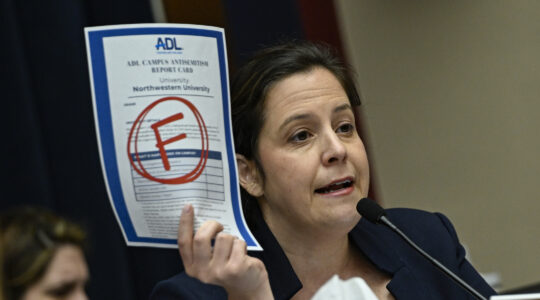WASHINGTON (JTA) — The Obama administration is reaping a whirlwind of criticism in the wake of pointed remarks about Israel by several U.S. officials over three days.
The U.S. ambassador to Belgium, Howard Gutman, caused an uproar when he suggested on Dec. 1 that hostility among European Arabs and Muslims toward Jews was rooted in anger over the Israeli-Palestinian conflict and should be distinguished from traditional forms of anti-Semitism. Jewish groups condemned his remarks, which drew calls for his dismissal from Republican presidential front-runners Newt Gingrich and Mitt Romney.
The following day, Secretary of Defense Leon Panetta stirred controversy when he told an audience at the Saban Forum, an annual Washington conclave for American and Israeli policymakers, that Israel needs to “get to the damn table” to negotiate with the Palestinians and “mend fences” with its neighbors. The Anti-Defamation League expressed “surprise and dismay” at a speech that it said “disproportionately put the onus on Israel to overcome its isolation.”
Secretary of State Hillary Clinton made waves a day later at the Saban Forum when she reportedly expressed some concerns about the state of Israeli democracy.
The confluence of controversies has added up to a headache for the Obama administration’s Jewish supporters and given fodder to its critics.
“This is the worst weekend we’ve had in a while,” said a Jewish Democratic activist, who spoke on condition of anonymity, referring to the outcry over the remarks.
Each set of remarks share a common theme, said the ADL’s national director, Abraham Foxman.
They’re “putting all of the onus on Israel, and that’s with Panetta, with Hillary and with the ambassador,” he said. “It’s something that we’ve had a problem with this administration.”
In his wide-ranging speech on U.S.-Israel relations, Panetta said that Israel needed to take steps to alleviate its isolation.
“For example, Israel can reach out and mend fences with those who share an interest in regional stability — countries like Turkey and Egypt, as well as Jordan,” Panetta said. “This is an important time to be able to develop and restore those key relationships in this crucial area. This is not impossible. If gestures are rebuked, the world will see those rebukes for what they are. That is exactly why Israel should pursue them.”
After the speech, the Saban Center’s Kenneth Pollack asked Panetta what steps Israel should take to advance peace. Panetta replied, “Just get to the damn table. Just get to the table. The problem right now is we can’t get them to the damn table to at least sit down and begin to discuss their differences — you know, we all know what the pieces are here for a potential agreement.”
Gingrich issued a statement condemning Panetta’s remarks.
“Barack Obama must tell the American people today whether he condemns or condones the deeply wrong statements by his Secretary of Defense and Ambassador to Belgium,” Gingrich said.
The Zionist Organization of America and the Emergency Committee for Israel — both consistent critics of the Obama administration — also blasted Panetta’s remarks. The ADL, however, was the main centrist Jewish group to take public umbrage.
“The Defense Secretary emphasized the shared U.S. and Israeli interest in deepened strategic cooperation and in countering the Iranian threat,” the ADL said in its statement. “But he undermined the sense of assurance that this could have projected by using a prestigious public platform to focus disproportionate responsibility on Israel for the campaign of hostility against her.”
The American Jewish Committee seemed less concerned. In a commentary on the group’s website, Ed Rettig, the director of its Jerusalem office, wrote that the headlines suggesting Panetta had scolded Israel were not reflective of the content of his speech.
“Contrary to the impression created by some reports, Secretary Panetta did not single out Israel for lack of progress in the peace process,” Rettig wrote, also noting that Panetta said that both Israel and Turkey need to repair relations.
Clinton’s remarks the next day at the Saban Forum were considered off the record and her session was closed to the media. According to news reports based on sources who attended, her speech went over familiar ground, such as the need to restart peace negotiations and the Iranian threat.
But in a question-and-answer session afterward, Clinton reportedly expressed concerns about some aspects of domestic Israeli politics. She was said to have criticized proposed Knesset legislation aimed at curbing foreign funding of Israeli NGOs and gender-segregated bus lines serving haredi Orthodox areas, among other domestic developments.
Israel’s finance minister, Yuval Steinitz, was quoted in the Israeli media calling Clinton’s remarks “totally exaggerated.”
“Israel is a living, breathing liberal democracy,” Steinitz said.
If reported accurately, Foxman said, Clinton’s comments were “out of line.”
“This is a secretary of state who certainly doesn’t go out to the Arab Muslim world and criticize them for inequalities,” the ADL leader said. “Sure, Israel is not perfect, human rights could use improvement, but my God, in comparison, I think it’s inappropriate, it’s excessive.”
Clinton has spoken about abuses of women’s rights in the Islamic world. In an April address at the U.S.-Islamic World Forum in Washington, she cited progress on addressing abuses of women’s rights in some Muslim countries and condemned those “who are actually working to undermine this progress and export a virulently anti-woman ideology to other Muslim communities.”
The National Jewish Democratic Council defended Panetta and Clinton.
“What Hillary Clinton is saying is what American Jewish leaders of all stripes have said,” said David A. Harris, the NJDC’s president and CEO. “It’s a pressing concern in our community.”
Harris also said that Panetta gave “a powerhouse speech,” one that encouraged “Israel to take bold steps” and that mainly focused on “how America is helping to secure Israel.”
Foxman, however, described the administration’s attitude toward Israel as “bifurcated.” He said that while the Obama administration has brought the U.S.-Israeli military alliance to newfound heights, it also has “done more politically to distance itself” from Israel.
“They’re trying to balance” between support for Israel and criticism of it, Foxman said, “and it’s not working.”
Jewish groups were more united in their disapproval of Gutman’s remarks, which he delivered at an event hosted by the European Jewish Union in Brussels.
Gutman noted “the problem within Europe of tension, hatred and sometimes even violence between some members of Muslim communities or Arab immigrant groups and Jews.” He argued that the problem is “largely born of and reflecting the tension between Israel, the Palestinian Territories and neighboring Arab states in the Middle East over the continuing Israeli-Palestinian problem.”
Advancing peace between Israel and its neighbors was the key to addressing this issue, he said.
Gutman’s framing of the issue rubbed many in the Jewish community the wrong way.
“Unfortunately, this administration’s policies of ‘daylight’ and pressure toward our ally Israel encourage the dangerously misguided tendency to make excuses for anti-Semitic hatred and bigotry,” Matthew Brooks, the Republican Jewish Coalition’s executive director, said in a statement.
His comments also prompted a rebuke from the NJDC’s Harris, though he declined to say whether Gutman should resign.
“Ambassador Gutman’s comments were wrong and unfortunate, and the White House was right to issue their immediate, tough statement on Saturday,” said Harris, referring to a statement sent over the weekend to Jewish leaders and others.
In the statement, the White House said that “we condemn anti-Semitism in all its forms, and that there is never any justification for prejudice against the Jewish people or Israel.”
However, at a briefing Monday, State Department spokesman Mark Toner said that Gutman, a prominent Democratic fundraiser, will not be asked to leave his post. Toner said that Gutman had the administration’s “full confidence.” He also said that the views expressed by Gutman were the envoy’s and not the administration’s.
Gutman has said that his remarks were “misinterpreted” and that he condemns all forms of anti-Semitism.
Barbara Goldberg Goldman, who was co-chair of the Obama campaign’s Jewish Community Leadership team in 2008 alongside Gutman and others, said she has “the utmost confidence that his intention was never to disparage Israel or her policies towards the peace process.”
“Knowing Ambassador Gutman and knowing his stanch pro-Israel stance,” Goldman added, “I would hope he’d be given an opportunity to address the criticism.”
(This article was produced in cooperation with the Washington Jewish Week.)
JTA has documented Jewish history in real-time for over a century. Keep our journalism strong by joining us in supporting independent, award-winning reporting.





